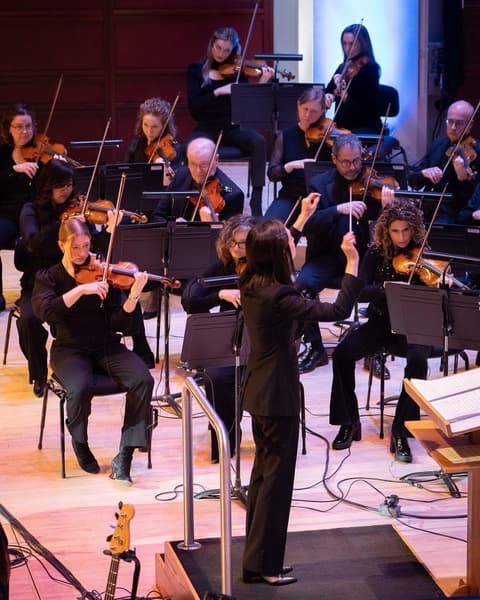Sophie Sze-Ki Mok is a rising star in the world of orchestral conducting. As the Assistant Conductor of the North Carolina Symphony, she has built an impressive resume that includes assisting the Asian Youth Orchestra and working with internationally acclaimed conductors such as Marin Alsop, Tan Dun, and Riccardo Muti. With a background as an oboist and years of experience guiding young musicians, Mok brings a unique perspective to her role. In this interview, she shares insights into her journey, inspirations, and the challenges of leading an orchestra.

Sophie Sze-Ki Mok © Pauline Ballet
Born and raised in Hong Kong, Mok’s musical journey began with the piano, as it does for many children in Asia. However, her mother encouraged her to participate in an ensemble, which inspired her to take up the oboe. “She told me I needed to make friends instead of just practising alone,” Mok recalls. That choice ignited a passion for music that would shape her future.
As her musical training progressed, Mok felt increasingly drawn to the prospect of a professional career in music. She pursued a bachelor’s degree in oboe performance at Hong Kong Baptist University and later earned a master’s from the University of Colorado at Boulder. However, her deepening fascination with conducting prompted her to seek further training in orchestral conducting at the College-Conservatory of Music (CCM) and to obtain an Artist Diploma from the University of Miami Frost School of Music, studying under Gerard Schwarz.
Mok’s passion for conducting began during her undergraduate studies in a conducting class. “Though it was only a semester-long course and not extensive training,” she shares, “I really enjoyed it and earned good grades, which provided a nice boost of encouragement.”
Mozart: Parto, parto, ma tu ben mio
Outside the classroom, Mok was fascinated by observing great conductors at work. She devoted hours to analysing their gestures and the manner in which they led rehearsals on YouTube. As time passed, her curiosity evolved into a strong desire to stand on the podium herself.
Mok’s early conducting experiences took place in Hong Kong, where she collaborated with the Hong Kong Youth Wind Philharmonia. Leading young musicians enabled her to refine her skills and gain insight into ensemble leadership. “With youth groups, you have more time to prepare them,” she explains. “Even if you rehearse only once a week, the process is much longer, allowing you to really focus on details.”
However, when she moved to the United States, she encountered a stark contrast in rehearsal schedules. “In university and professional settings, rehearsal time is significantly shorter. You must be incredibly efficient and know precisely what to fix at the moment.”
Conducting is more than just musical knowledge—it requires leadership, communication, and problem-solving skills. Mok acknowledges that formal education does not always cover these aspects. “But my teacher, Gerard Schwarz, was an experienced music director who shared valuable insights on dealing with composers, soloists, and orchestra members.”
By watching Schwarz and other conductors, Mok learned the importance of clear communication and adaptability. “You need to understand how to work with various personalities and make quick decisions during rehearsals,” she adds.

Sophie Sze-Ki Mok
One of Mok’s most cherished experiences was returning to her alma mater, Hong Kong Baptist University, to conduct Mahler’s Fourth Symphony. “It was my first Mahler Symphony, and standing on the same stage where I once played as a student felt incredibly meaningful,” she reflects. “It was an emotional full-circle moment.”
A recurring debate in classical music is whether audiences should clap between movements. Mok embraces the enthusiasm of new audiences. “My teacher, Gerard Schwarz, always said that if people clap between movements, it means they’re new to classical music, and that’s a good thing! It means we’re reaching fresh audiences.”
She also shares an anecdote about a symphony donor who had never attended a classical concert until recently. “She had never experienced this world before, and now she loves it. That’s what’s important—introducing more people to this beautiful art form.”
As the Assistant Conductor of the North Carolina Symphony, Mok continues to grow as a musician and leader. While her current role involves covering conductors and assisting with performances, she looks forward to opportunities to lead full programs in the future. “Right now, I’m absorbing as much as I can and refining my craft,” she says. “Conducting is a lifelong learning process.”
With her passion, experience, and dedication, Sophie Sze-Ki Mok is poised to make a significant impact on the classical music world. As she continues her journey, audiences can look forward to seeing her at the podium, shaping the sounds of great orchestras with skill and heart.
For more of the best in classical music, sign up for our E-Newsletter



